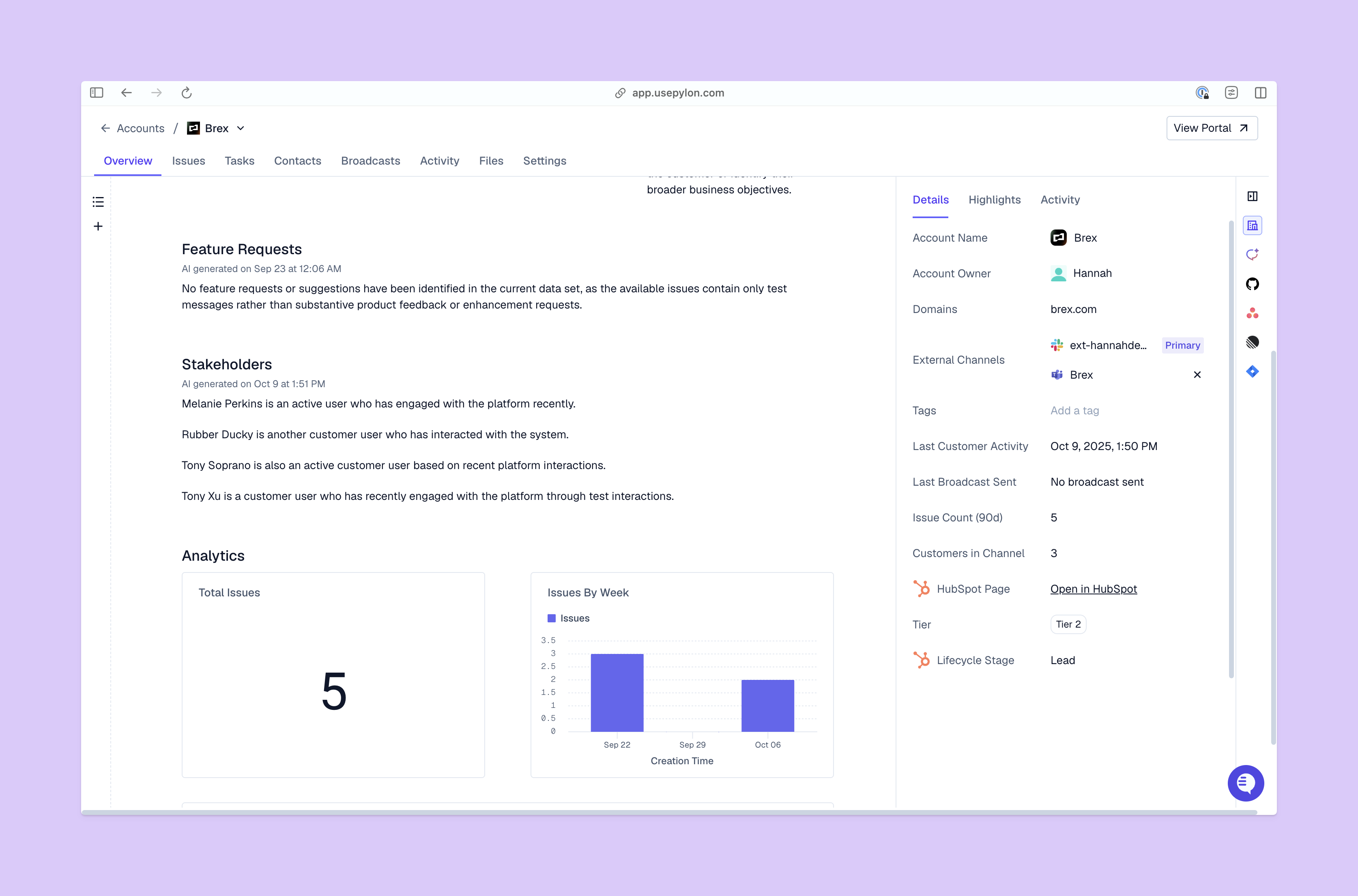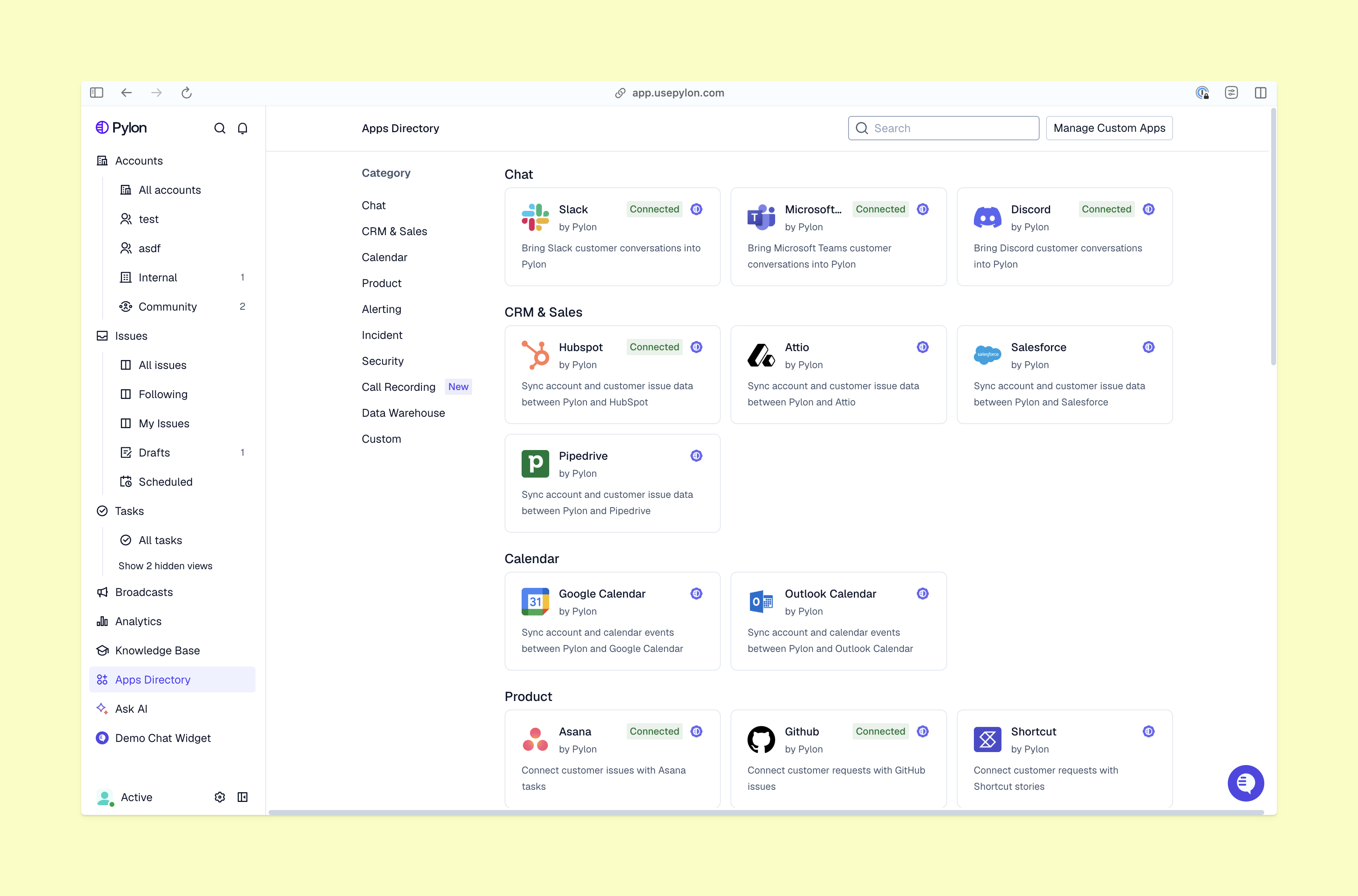Best Customer Success Tools to Proactively Manage B2B Accounts in 2025
The top customer success platforms integrate customer success workflows with your support data, so you can proactively manage your accounts. Discover the best tools for B2B post-sales teams.
Updated November 19, 2025 | 23 min read
TL;DR
You need a customer success platform that helps you reduce churn, increase retention, and scale support operations.
This guide covers leading platforms for B2B teams that help you proactively manage your accounts. We'll explore 15+ platforms, including solutions that integrate with Slack and the rest of your customer support stack.
Key takeaways:
- Modern customer success platforms combine health scoring, automation, and AI to predict churn before it happens
- Platforms like Pylon integrate your support data with customer success workflows
- The best customer success platform depends on your tech stack, customer data complexity, and team maturity
What Are Customer Success Platforms?
Customer success platforms help teams proactively manage customer relationships. Unlike traditional customer support software that reacts to problems as they come up, customer success platforms help teams anticipate issues, drive product adoption, and maximize customer lifetime value.
Core Capabilities of Customer Success Platforms
The best customer success platforms for support teams have features like:
- Customer health scoring: AI-powered algorithms that analyze usage patterns, support tickets, and engagement to predict churn risk
- Automated playbooks: Trigger-based workflows that guide customers through onboarding, adoption, and renewal
- 360 customer view: Unified dashboards that aggregate data from CRM, product analytics, billing, and support systems
- Proactive outreach: Automated communications at critical lifecycle moments
- Revenue forecasting: Predictive models for renewals, expansion, and upsell opportunities
For B2B companies, integrating customer success with your existing support infrastructure is critical. Teams using platforms like Slack as a ticketing system need customer success tools that work seamlessly with their collaboration workflows.
The 15 Best Tools for Customer Success in 2025
1. Pylon
Best for: B2B companies who want unified customer context for support and success
Pylon is the all-in-one support platform for B2B teams. Most teams rely on fragmented tools where your support and customer success functions live in totally different places, but Pylon unifies customer intelligence for your whole post-sales org.
Key features:
- Native integrations for Slack, Teams, and Discord integrations so you get full conversational context from customer interactions
- AI that can calculate custom health scores, track sentiment, and flag churn risks based on conversational data across support and success interactions
- Account Intelligence that brings together data from customer interactions across support and success, your CRM, and data warehouse
- Manage support ticketing, analytics, customer conversations, accounts, and more all in one place
Integrations: 40+ tools including Slack, Microsoft Teams, Discord, Salesforce, HubSpot, Attio, and and API
Learn more about using Slack for customer support and why companies are switching from Zendesk to modern platforms like Pylon.

2. Gainsight
Best for: Mid-market and enterprise companies with complex data needs
Gainsight offers data integration, health scoring, and automation capabilities. The platform can synthesize data from multiple sources to create comprehensive health scores.
Key features:
- Customer 360 view with data from CRM, product analytics, billing, and support
- Playbook library with pre-built templates
- Journey Orchestrator for multi-step customer workflows
- Digital CS capabilities for low-touch customer segments
Pros:
- Strong revenue operations capabilities
- Extensive integration ecosystem
Cons:
- High implementation complexity (4-8 weeks typical)
- Steep learning curve for new users
- Premium pricing makes it cost-prohibitive for smaller teams
3. ChurnZero
Best for: B2B SaaS companies focused on churn prevention
ChurnZero specializes in real-time health monitoring and automated interventions for subscription businesses. The platform integrates with billing systems to track subscription metrics alongside usage data.
Key features:
- Real-time health scores with automated alerts
- In-app messaging and product tours
- Customer segmentation based on usage, health, and lifecycle stage
- ChurnScore algorithm that predicts renewal likelihood
- AI CoPilot for task automation
Pros:
- Excellent for tracking subscription-based metrics
- White-glove onboarding experience
- Strong automation capabilities
Cons:
- Requires consistent data cleanup to maintain accuracy
- UI can feel overwhelming for new users
- Some advanced AI features require additional fees
4. Totango
Best for: Teams that want pre-built playbooks and workflows
Totango offers 200+ SuccessBLOC templates. These are pre-configured playbooks for common customer success scenarios like onboarding, adoption, and renewal. This makes it easier for teams to get started quickly.
Key features:
- 200+ pre-built SuccessBLOC templates
- Modular pricing that supports phased adoption
- Unison AI for predictive churn insights
- Multi-dimensional health scoring
- SuccessPlay designer for custom workflows
Pros:
- Extensive template library accelerates time-to-value
- Flexible pricing model
- Strong predictive analytics
Cons:
- Steep learning curve for custom reporting
- Interface can feel clunky for advanced tasks
- Requires admin training to maximize value
5. Planhat
Best for: Companies that need to tie customer success metrics to financial outcomes
Planhat positions itself as a revenue operations platform, connecting customer success activities directly to revenue metrics. The platform's Revenue Hub provides visibility into how customer health impacts the bottom line.
Key features:
- Powerful open API for custom integrations
- Revenue Hub ties CS metrics to financial forecasting
- AI Assist for account reviews and email generation
- Flexible data model that adapts to complex hierarchies
- Unified timeline view of all customer interactions
Pros:
- Excellent for data-driven organizations
- Strong API enables deep customizations
- Revenue-focused dashboards
Cons:
- Workflow designer has steep learning curve
- Limited inline customization in workflows
- Implementation can be time-intensive
6. Vitally
Best for: Growing teams that need quick deployment
Vitally emphasizes ease of use and rapid deployment. Most teams can implement the platform in under two weeks with minimal training required.
Key features:
- Consumer-grade, intuitive UI
- Self-serve implementation in ~2 weeks
- Customizable widget dashboards
- Meeting sync with automated note-taking
- Project management capabilities within accounts
Pros:
- Minimal training required
- Transparent pricing model
Cons:
- Playbook automation lacks advanced logic features
- No custom functions or HTTP calls in workflows
- Limited built-in survey customization
7. Custify
Best for: Early-stage SaaS companies building their first CS function
Custify offers a straightforward approach to customer success for SaaS businesses, focusing on the basics: health scoring, lifecycle tracking, and automated alerts.
Key features:
- Customer 360 view with usage and engagement tracking
- Rule-based health scoring
- Automated alerts for churn risk
- Lifecycle stage management
- Dashboard and reporting capabilities
Pros:
- Fast onboarding from spreadsheets
- Affordable pricing for SMBs
- Easy-to-configure rule-based alerts
Cons:
- Recurring task management is mostly manual
- Limited AI and predictive features
- Smaller template library than competitors
8. ClientSuccess
Best for: Teams that prioritize simplicity and ease of use
ClientSuccess focuses on four key stages of the customer journey: onboarding, adoption, renewal, and growth. The platform's clean interface makes it accessible for teams without extensive technical expertise.
Key features:
- Clean, executive-friendly account views
- Rapid deployment with minimal admin work
- Pulse health scores
- SuccessCycle for journey tracking
- Goal tracking and progress monitoring
Pros:
- Intuitive user interface
- Minimal training required
- Flat-rate pricing model
Cons:
- Limited survey customization options
- Basic automation compared to competitors
- Scalability constraints with flat pricing
9. Zendesk
Best for: Traditional enterprises with customer service needs
While primarily known as a customer service and support platform, Zendesk has some customer success capabilities through Zendesk QA and its AI-powered features.
Key features:
- AI agents trained on 18 billion customer service interactions
- AI-powered QA that scores interactions and identifies churn risk
- Omnichannel routing across email, chat, phone, and social
- Agent Copilot for suggested responses
Pros:
- Purpose-built AI for customer experience
- Extensive integration ecosystem
Cons:
- Can be complex for smaller teams
- Higher learning curve than competitors
- Many features require add-ons
Many B2B companies are exploring Zendesk alternatives that offer more modern, collaborative experiences. Learn more about why companies are switching from Zendesk in 2025.
10. Intercom
Best for: Global teams serving customers in multiple languages
Intercom has strong multilingual support and proactive messaging features.
Key Features:
- Fin AI chatbot for automated support
- Product tours and in-app messaging
- Multilingual help center
- Series automation for customer lifecycle management
Pros:
- Strong proactive communication tools
- Excellent for product-led growth companies
- Robust multilingual capabilities
Cons:
- Can become expensive as you scale
- Some users find the platform complex
- Limited custom reporting options
Additional Platforms to Consider
11. SmartKarrot – AI-powered call sentiment analysis and integrated business intelligence layer
12. Akita – Lightweight solution for SaaS startups
13. OnRamp – Specialized in B2B customer onboarding with Kanban-style workflows
14. UserGuiding – Product tour and walkthrough platform for user adoption
15. EverAfter – Customer portal builder for B2B relationship management
16. Velaris – Multi-layer AI health scoring with predictive next-best actions
17. InMoment – Feedback and sentiment analysis platform
Quick Comparison: Leading Platforms for Customer Success
How to Choose the Best Customer Success Platform for Your Support Team
To pick the right customer success platform, you need to understand your team's specific needs, technical constraints, and growth trajectory. Use this framework to evaluate the different options:
1. Assess Your Current Stage
Early-Stage (Seed to Series A)
- <50 paying customers, 1-2 CSMs
- Priority: Replace spreadsheets, establish basic health scoring, get up and running in <2 weeks
- Best Fit: Pylon, Custify, ClientSuccess
Growth Stage (Series B-C)
- 50-500 customers, 2-15 CSMs
- Priority: Automate repetitive tasks, implement proactive playbooks, catch churn early with AI
- Best Fit: Pylon, ChurnZero, SmartKarrot
Enterprise (Late-Stage & Public)
- 500 customers, global CSM organization
- Priority: Advanced segmentation, custom analytics
- Best Fit: Pylon, Gainsight, Totango, Planhat
2. Evaluate Your Tech Stack Integration
Your customer success platform should integrate with your existing tools:
Explore more about integrating your CRM with help desk tools.
3. Prioritize Your Capability Gaps
Different platforms excel at different aspects of customer success:
4. Run a Structured Pilot (30 Days)
Before committing to a platform, run a structured 30-day pilot with your top 2-3 options:
Week 1: Connect CRM and product data feeds, import 10 test accounts
Week 2: Configure health scoring and automated alert playbooks
Week 3: Test integrations with Slack/Teams/Discord and generate executive reports
Week 4: Gather feedback from CSMs and measure admin overhead
Score each platform on:
- Health Accuracy: Does the scoring model accurately predict churn?
- Admin Effort: How many hours per week does platform management require?
- Time-to-Value: How quickly can CSMs start seeing benefits?
5. Consider Total Cost of Ownership
Pricing models vary significantly across platforms:
- Per-seat pricing: Pylon, Zendesk, Intercom (scales with team size)
- Account-based pricing: Gainsight, Planhat (scales with customer count)
- Flat-rate pricing: ClientSuccess, some Custify tiers (predictable but may constrain growth)
- Usage-based pricing: Some platforms charge based on data volume or API calls
Don't forget to ask about costs for:
- Implementation services and onboarding
- Integration development and maintenance
- Admin time for configuration and reporting
- Training and change management
Key Features to Look for in Customer Success Software
When evaluating customer success platforms, prioritize these capabilities:
1. Customer Health Scoring
Health scores aggregate multiple signals—product usage, support tickets, engagement, sentiment—into a single metric that predicts churn risk. Look for:
- Multi-dimensional scoring: Ability to weigh different factors by customer segment
- Real-time updates: Health scores that refresh as customer behavior changes
- Predictive analytics: AI that forecasts renewal likelihood and expansion potential
- Custom scoring: Flexibility to define your own health metrics
2. Automated Playbooks and Workflows
Playbooks codify your customer success best practices into repeatable, automated workflows:
- Lifecycle-based triggers: Automatic actions based on onboarding stage, renewal date, etc.
- Behavioral triggers: Actions triggered by product usage, support tickets, or engagement drops
- Multi-channel execution: Ability to reach customers via email, Slack, etc.
3. Omnichannel Support
Customers expect to engage with you on their preferred channels. The best platforms support:
- Email, in-app chat, support forms, and more
- Native Slack, Microsoft Teams, and Discord support
- Bi-directional syncing that maintains context across channels
- Conversation history that follows customers across touchpoints
Learn more about omnichannel support best practices for B2B.
4. Account Intelligence and 360 Views
Your customer success platform should aggregate data from across your tech stack:
- CRM data: Account details, contacts, contracts, and relationships
- Support data: Ticket history, response times, CSAT scores
- Communication history: Emails, call recordings, in-app messages, Slack conversations
5. Revenue and Forecasting Capabilities
Customer success should directly impact revenue. Look for:
- Renewal likelihood predictions based on health scores
- Expansion opportunity identification (upsell and cross-sell)
- Churn risk quantification with revenue impact
- Pipeline tracking for customer success-driven opportunities
6. Integration Ecosystem
The platform should connect with your existing tools:
- CRM: Salesforce, HubSpot, Pipedrive
- Communication: Slack, Microsoft Teams, Discord, email
- Data warehouses: Snowflake, BigQuery, Redshift
Pylon offers native integrations with communication platforms, data warehouses, call recorders, your CRM, and more.

Customer Success Platform ROI: What to Expect
According to industry research, companies that implement customer success platforms see measurable improvements across key metrics:
Typical ROI Metrics
Churn Reduction: 15-25% decrease in logo churn within 12 months
- Early identification of at-risk accounts enables intervention
- Automated playbooks ensure consistent customer experience
- Health scoring surfaces problems before customers consider leaving
Expansion Revenue: 20-40% increase in upsell/cross-sell
- Visibility into product usage reveals expansion opportunities
- Automated triggers prompt CSMs to reach out at optimal moments
- Data-driven account prioritization focuses efforts on high-potential accounts
CSM Productivity: 30-50% increase in accounts per CSM
- Automation eliminates repetitive administrative tasks
- Playbooks codify best practices for consistent execution
- Prioritized queues ensure CSMs focus on highest-impact activities
Time-to-Value: 40-60% faster customer onboarding
- Automated onboarding playbooks guide customers through setup
- Proactive outreach addresses blockers before they escalate
- Usage tracking ensures customers reach critical adoption milestones
For B2B companies using Slack-native platforms like Pylon, the benefits extend to customer satisfaction as well. When you support customers in the channels they already use, it improves response times and reduces friction.
Frequently Asked Questions (FAQs)
1. What's the difference between a customer success platform and a help desk?
Help desks (like traditional ticketing systems) focus on reactive support—resolving issues after customers encounter problems. Customer success platforms take a proactive approach, predicting issues before they occur and guiding customers toward desired outcomes. Modern platforms like Pylon combine both capabilities, offering core customer support software with customer success tools.
2. How long does it take to implement a customer success platform?
Implementation timelines vary by platform complexity and your data readiness:
- Fast deployment (1-2 weeks): Pylon, Custify
- Standard deployment (3-6 weeks): ChurnZero, Totango, ClientSuccess
- Complex deployment (8-12 weeks): Gainsight, Planhat, Zendesk
Factors that affect timeline include data quality, number of integrations, and customization requirements.
3. What metrics should I track with customer success software?
The most important customer success metrics include:
- Customer health score: Composite metric predicting churn risk
- Net Revenue Retention (NRR): Revenue from existing customers including expansion
- Logo churn rate: Percentage of customers who cancel
- Time-to-value: How long until customers reach first value milestone
- Product adoption rate: Percentage of customers using key features
- Customer Satisfaction (CSAT) / Net Promoter Score (NPS): Customer sentiment metrics
Learn more about customer support KPIs B2B businesses need to track.
4. Should I buy separate tools for customer support and customer success?
For most B2B companies, unified platforms that combine support and customer success deliver better outcomes than point solutions. Benefits include:
- Single source of truth for customer data
- Support patterns feeding into health scores
- Seamless handoffs between support reps and CSMs
- Unified reporting and analytics
- Lower total cost of ownership
Platforms like Pylon offer best-in-class B2B customer support with integrated customer success capabilities.
5. How do I measure ROI on customer success software?
Track these metrics before and after implementation:
- Gross logo churn rate: Percentage of customers lost
- Net Revenue Retention: Revenue retained + expanded from existing customers
- Expansion revenue: Upsell and cross-sell from customer success efforts
- Customer lifetime value: Average revenue per customer over relationship
- CSM efficiency: Number of accounts managed per CSM
- Time saved: Hours per week saved on administrative tasks
Most companies see positive ROI within 6-12 months of implementation.
6. What's the best customer success platform for small teams?
For small teams (1-5 people), prioritize ease of use and fast implementation:
- Custify: Best for simplicity and affordable pricing
- Vitally: Fastest implementation with consumer-grade UI
- Pylon: Best for teams who need all their post-sales data in one place
- ClientSuccess: Clean interface with minimal training required
Avoid over-buying enterprise platforms that require dedicated administrators.
7. Can customer success platforms help with customer onboarding?
Absolutely! Onboarding is a core use case for customer success platforms:
- Automated playbooks guide customers through setup steps
- In-app messaging prompts users to complete key actions
- Progress tracking shows which customers are stuck
- Automated alerts notify CSMs when onboarding stalls
- Templates ensure consistent onboarding experiences
Specialized tools like OnRamp focus exclusively on onboarding, while comprehensive platforms integrate onboarding into the broader customer lifecycle.
Additional Resources
- Customer Service Software Guide
- Best B2B Customer Support Platforms 2025
- 50 Customer Support Statistics & Trends for 2025
- Best Practices for an Impactful Customer Success Strategy
- How to Effectively Scale B2B Customer Support
Choosing the Right Customer Success Platform
When you’re evaluating different tools for your customer success function, make sure the platform capabilities match your specific needs.
For collaborative post-sales teams: Pylon offers customer success tools that integrate with your support workflows, which eliminates context-switching.
For template-driven success: Totango provides 200+ pre-built playbooks that accelerate time-to-value.
For budget-conscious teams: Platforms like ClientSuccess and Custify offer predictable pricing that won't scale prohibitively as you grow.
Pylon is the modern B2B support platform that offers true omnichannel support across Slack, Teams, email, chat, ticket forms, and more. Our AI Agents & Assistants automate busywork and reduce response times. Plus, with Account Intelligence that unifies scattered customer signals to calculate health scores and identify churn risk, we're built for customer success at scale.











